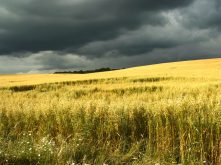It was just one line in a 25-page report, but it stood out: “It is a popular misconception that farmers are making a lot of money in agricultural enterprises.”
As a journalist, I’ve never had to worry that people will think I’m wealthy. But, according to the report, the notion of “rich farmers” is widely held. And something that concerned the farm leaders I asked to comment on the report (which, ironically, is mostly about how virtually all farms — even big ones — rely on off-farm income to make ends meet).
Read Also

Deep cuts to ag research jeopardize Canada’s farming future
The huge cuts to ag research at Agriculture Canada are being widely panned by farm organizations, but there seems to be little hope of the government reversing its decision.
“The ‘rich farmer’ meme is hurtful and petty,” Kevin Auch wrote in an email reply to my questions.
I’d asked him, and some other Alberta farm leaders, about off-farm income and whether it was unfair that farming alone isn’t enough to make a living.
“It can be upsetting for us farmers when those who don’t understand farming start maligning us because farms have accumulated what seems like excessive amounts of assets and equity,” said Auch, who is chair of Alberta Wheat (but who stressed, like the others who were contacted, that he was just giving his personal view).
“There are very sound reasons why farmers down through the ages have had to have seemingly large amounts of fixed assets, especially compared to the small margins those assets generate.”
Those reasons are familiar to anyone who farms — but Alberta Barley chair Jason Lenz summed it up nicely.
“There is an extreme lack of understanding of the low-margin, high-risk business that farming is,” he said. “While it is surprising that after all these years this perception still exists, any equity that has been built up in a farm has more than likely come from generations of ‘squeezing nickels’ and long-term financial planning.”
Actually, I expect that perception is only going to grow stronger.
We live in a time when people are obsessed about property values. Sure, the focus is mainly on insanely high prices for homes in Toronto and Vancouver. But people can do the math — they know farm size is now measured in thousands of acres and the ‘price of dirt’ has gone up and up and up. And while they may not know the price of a combine or tractor, they’ve got a pretty good idea that they don’t come cheap.
So this perception of “rich farmers” will likely only become more entrenched. It’s something that farm leaders have to be ever conscious of when dealing with issues such as farm programs, especially farm income support.
But the farmers I contacted are way ahead on that score.
None took a bite on my leading question (sue me, I’m a journalist) about whether “there was something wrong with the picture” of needing off-farm income to balance the budget.
That’s just “a reflection of how farm families are no different than other families in our society,” said Alberta Canola Producers chair Greg Sears.
“The number of families that rely on a single source of income — whether it is farming or teaching or whatever — continues to decline,” he said. “Part of that is economics but it’s also a reflection of education, lifestyles, and career choices that people now make. The farm family is no longer a farmer, his wife, and kids working solely on the farm.”
Like the others, Sears said he’s not looking for government support — other than financial risk management programs — even though the federal government says it wants to make agri-food a key driver in the economy.
“The ‘economic foundation’ of farming is something that is really established by market fundamentals — supply and demand,” he said. “I don’t see the government having either the resources or political will to influence that part of the equation.”
In fact, the main thing government can do is get out of the way, he and others said. Lenz again summed up that view in a memorable way.
“We need to be competitive with others in the world and the regulatory pit that we live in here in Canada is far more stringent than what many other jurisdictions have,” he said. “In many cases, these regulations act as a barrier for us if we want to take advantage of a changing marketplace.”
It’s worth remembering that this view wasn’t always widely held. I’ve been in journalism long enough to remember the days when farm leaders spent much of their time organizing ‘tractor demonstrations’ and lobbying governments to spend billions on payouts because the marketplace was so unfair.
Today, the attitude is, ‘Bring it on — we’re ready, able, and eager to compete with anyone.’
Yes, that will mean that on most farms, someone will need to be pulling in a steady paycheque from an off-farm job and that most of the public will have no idea of how tough it is to build a successful farm business.
But it also means that if governments are sincere in wanting agriculture to be an even bigger driver of economic prosperity in Canada, they’ve picked the right partners.
If you want to read the Off-farm Income in Alberta report, search ‘off-farm income.’ at www.agriculture.alberta.ca.
















